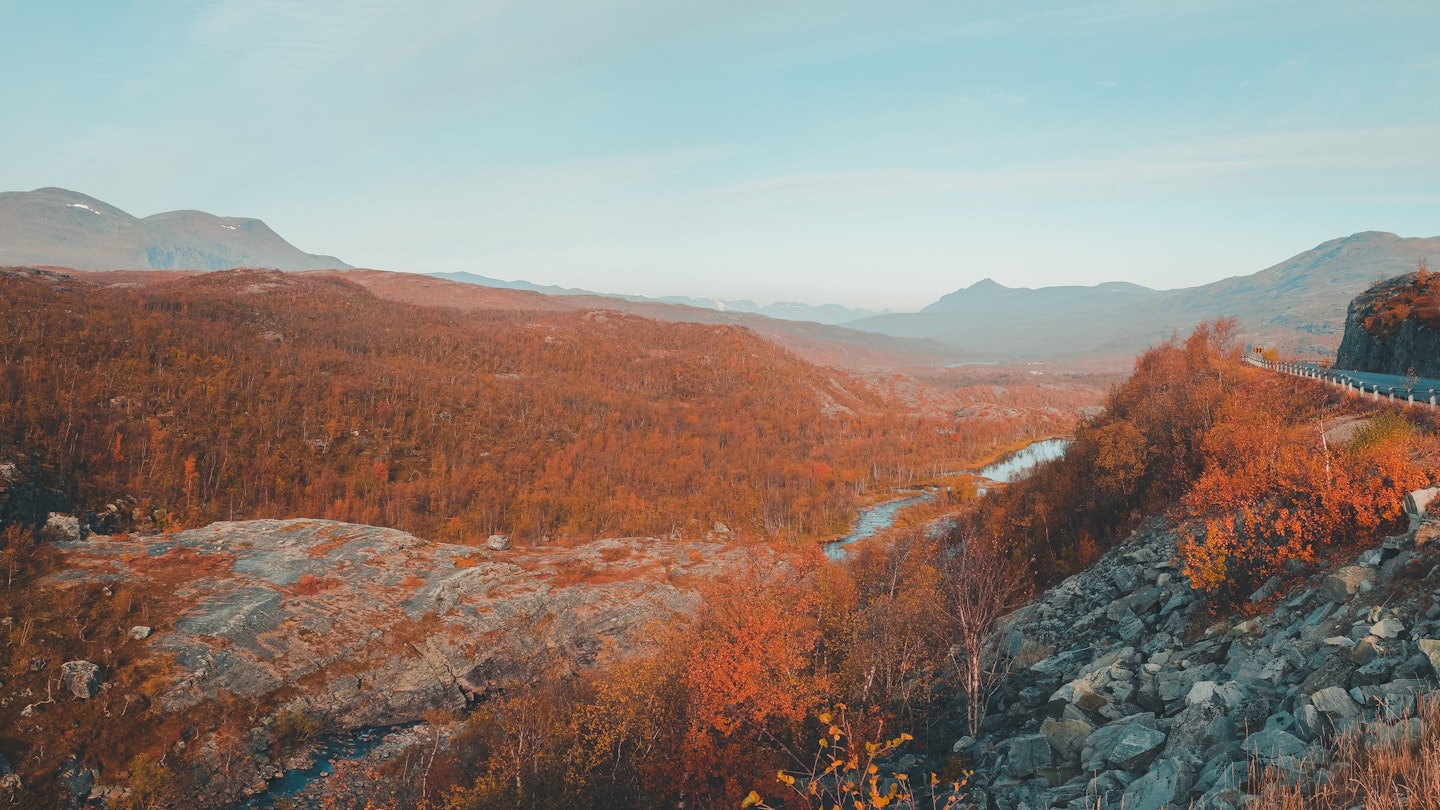Experience Autumn in Finland – A Journey Through Ruska
Warm, lemon-yellow sunshine on a cornflower blue lake; the sound of leaves falling in the forest like soft rain; carpets of crimson berries crunching underfoot – nowhere does autumn come in such a burst of sensory glory as in Finland.
Locals even have a special name for the fleeting season, ruska, and for a few short weeks in September and early October, ruska pilgrims head out to catch summer’s final flourish before the winter darkness descends.
Editor’s note: Always check local restrictions before planning a trip and follow government health advice.

Since Finland is full of wilderness – 74 percent of the country is covered in boreal forest – you can experience ruska almost anywhere. However, the further north you go, the more intense the colours become. Broadleaf trees, conifers, berry bushes, and moss create a multi-layered tapestry of green, auburn, gold, copper, crimson, and smoky blue.
Fall in the Arctic Circle
Enontekiö, in the furthest northwestern reaches of Lapland, just 50km from the Arctic Sea, exemplifies autumn in Finland. As the leaves begin to turn in early September, Kilpisjärvi, the region’s largest Saami village, is cradled in a stunning golden triangle of mountain birch trees between the borders of Norway and Sweden.
The great Saana Fell (1029m) rises out of the village cloaked in an ankle-deep mat of richly coloured lingonberries, bilberries, crowberries, and bear berries – remnants of wedding garments, locals believe, worn during the ill-fated marriage of the giant Saana to the nearby Malla Fell.

These great fells stand watch over Malla Strict Nature Reserve – Finland’s oldest conservation area established in 1916. Enontekiö’s parks encompass a rare range of Arctic and alpine flora and fauna, specially adapted to the high altitude of the fells and the unique marine-influenced microclimate.
Finns flock here in droves during ruska for three brief weeks of glorious, mosquito-free hiking, biking, and canoeing amid the paprika-dusted mountains. Additionally, ruska autumn markets pepper the villages and husky farms like Hetta Huskies start their autumn training, running dogs through the golden landscape with quad bikes.

The trails in Malla Strict and the Käsivarsi Wilderness Area are probably some of the best in the world, featuring wilderness cabins along almost all routes. Popular trails include the easy 4km hike up Saana Fell; the 55km section of the Halti trail between Kilpisjärvi and Finland’s highest fell, Halti (1328m); and the stunning track through Malla Strict’s berry moors to the Three Nations Border Stone, where Finland, Sweden, and Norway meet.
The border stone sits on a man-made island in Lake Koltapahtajärvi, reachable by the Malla boat from Kilpisjärvi or via the 11km Crimson Trail through Malla Strict. For more information, visit the Visitor Centre.

Koli: Finland’s Most Famous Autumn Landscape
As the season starts to fade in Lapland, the fall colours travel south like a colourful wave. By the third week in September, the rolling hillsides of Koli National Park are daubed in orange, red, and yellow. Climbing to the top of Ukko-koli (354m) offers the same view that artist Eero Järnefelt had in 1899 when he painted his iconic Autumn Landscape of Lake Pielisjärvi.
The Koli peaks are the southernmost summits in Finland, swathed in tall, candle-like spruce trees, pines, birch, and aspen. These trees are extraordinarily tall as the forest hasn’t been cut for a century. Traditional farming methods maintain the historic views: swidden fields are cleared every year, meadows are mown by hand, and traditional Finncattle and Finnsheep graze the park’s pastures.
The easiest way to immerse yourself in the herb-rich forest is to take the Paimenenpolku Trail (Shepherd’s Trail) from the Nature Centre Ukko or visit one of the heritage farms such as Kolin Keidas in Mattila.
Artistic Autumn Landscapes at Lake Tuusula
Although Eero Järnefelt painted endless scenes of Koli, it was his brother-in-law, composer Jean Sibelius, who captured the mythic spirit of Finland’s forests in his radical symphonies. Inspired by Koli and the dark tales of the Kalevala, Sibelius wrote most of his major works from his beautiful lakeside villa, Ainola, on the shores of Lake Tuusula, barely 40km north of Helsinki.
You can visit the house with its glazed Scandinavian stoves and Steinway grand piano, then walk down to the glittering lake in search of migrating cranes, swans, and taiga geese, just as Sibelius did. A cultural trail around the shore takes you past the homes of fellow artists and musicians such as Juhani Aho, Venny Soldan-Brofeldt, Pekka Halonen, and Joonas Kokkonen.
The latter lived in a beautiful contemporary home designed by Alvar Aalto. With prior arrangement, you can visit Villa Kokkonen for lunch and a private concert.

Autumn’s Last Gasp in Nuuksio National Park
As snow begins to fall in Lapland, October offers urbanites in Helsinki one last burst of colour in nearby Nuuksio National Park. The park is even accessible by public transport. Visitors can take the commuter train to Espoo, then bus number 85 to the Haltia Nature Centre, where they can plot their hiking routes and connect with guides and activity experts such as Feel the Nature, who also offer pick up from Helsinki.
With the summer season concluded, Nuuksio’s forest is cool and quiet. The aspen trees are starting to lose their golden leaves, and the forest floor is covered in a carpet of Scots pine needles. Foragers hunt for the last bilberries, cranberries, and chanterelle mushrooms, carefully ferrying them back to snug log cabins at Hawkhill Nature to cook over an open fire with some stove-smoked salmon.
Back in Helsinki, the Sibelius Academy is starting its autumn season of concerts, but here in the forest, you’ll already be humming autumn’s shimmering notes along with the woodlarks.





